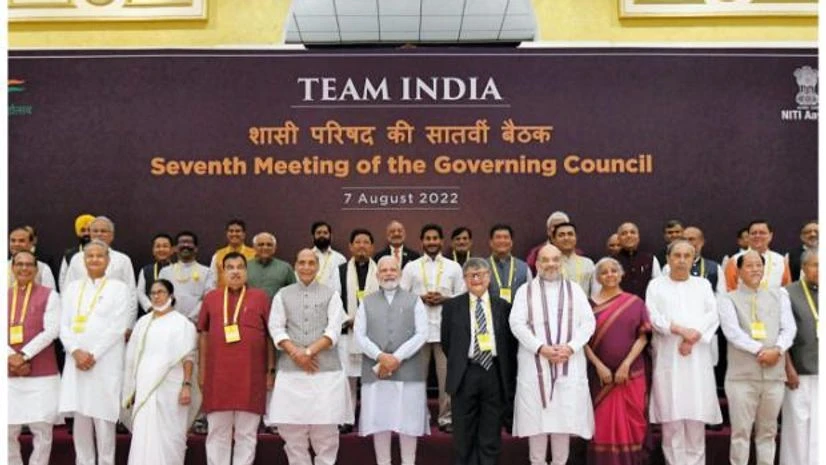Prime Minister Narendra Modi on Sunday made a strong case for modernising agriculture, animal husbandry and food-processing to help the country become self-sufficient and a global leader in the agriculture sector, even as some states demanded that the MSP mechanism be made more effective in case of pulses and oilseeds.
The Prime Minister also asked the states to focus on promoting 3Ts -- Trade, Tourism, Technology -- with a view to reducing imports and increasing exports, said an official release after the seventh meeting of the Governing Council of NITI Aayog.
"We should encourage people to use local goods wherever possible," he said, adding 'Vocal for local' is not the agenda of a political party but a common goal.
India, he said, needs to "focus on modernized agriculture, animal husbandry, and food processing to become self-sufficient and a global leader in the agriculture sector."
Some states, during the meeting, came up with various suggestions for expeditious diversification of agriculture, said NITI Aayog member Ramesh Chand while briefing reporters about the conference.
"...states suggested that if they are helped in a particular way, they can go for diversification in a faster manner....Two states mentioned about making minimum support price (MSP) for pulses and oilseeds more effective," said Chand.
The Prime Minister, in his remarks, raised the issue of rapid urbanisation, saying it can become India's strength instead of weakness by leveraging technology to ensure ease of living, transparent service delivery, and improvement in the quality of life for every citizen.
He also appreciated the collective efforts of all the states in the spirit of cooperative federalism in the fight against the Covid-19 pandemic.
More From This Section
"Every State played a crucial role according to its strength and contributed to India's fight against Covid. This led to India emerging as an example for the developing nations to look up to as a global leader," he said.
The Prime Minister underlined the need for collective action to increase collection of the Goods and Services Tax (GST), saying though the realisation has improved, "the potential is much more... and it is crucial for strengthening our economic position and becoming a USD 5 trillion economy."
In his concluding remarks, Modi said the NITI Aayog will study the states' concerns, challenges, and best practices and subsequently plan the way forward.
The issues discussed in this meeting will define the national priorities for the next 25 years, he said, adding, "the seeds we sow today will define the fruits reaped by India in 2047."
The Prime Minister also spoke about India's G20 presidency in 2023, saying "we should develop a mass movement around G20. This will allow us to identify the best talent available in the country."
He further said there should be a dedicated team for G20 in the states to derive the maximum possible benefit from the initiative.
G20 is grouping of developed and developing nations.
This was the first physical meeting of the Governing Council since the onset of the pandemic, with the 2021 meeting held via video conferencing.
The meeting was attended by 23 chief ministers, 3 lieutenant governors and 2 administrators and Union ministers and moderated by Defence Minister Rajnath Singh.
Telangana Chief Minister K C Rao boycotted the meeting, while his Bihar counterpart Nitish Kumar could not attend as he was recovering from Covid.
The Governing Council discussed four key agenda items -- crop diversification and achieving self-sufficiency in pulses, oilseeds and other agri-commodities; implementation of the National Education Policy (NEP) in school education; implementation of NEP in higher education; and urban governance.
Speaking at the meeting, External Affairs Minister S Jaishankar said, "The G20 Presidency presents a great opportunity and a great responsibility. For the first time in the history of G20, India will host the G20 meetings over the year, not only in Delhi, but in every State and Union Territory."
Education Minister Dharmendra Pradhan spoke about the NEP and highlighted initiatives undertaken to boost learning outcomes, capacity-building of teachers, and skilling.
NITI Aayog Vice Chairman Suman Bery told reporters that the meeting also discussed the issue of timely release of funds to states and financing of municipal corporations.
Chhattisgarh Chief Minister Bhupesh Baghel demanded a five-year extension for the compensation paid to states for revenue shortfall due to GST implementation and called for revising the rates of royalty for coal and other major minerals.
Noting that Odisha is impacted by natural disasters almost every year, Chief Minister Naveen Patnaik urged the Centre to make it a special focus state and allocate funds for disaster proofing.
Andhra Pradesh Chief Minister Y S Jagan Mohan Reddy said his government has been according top priority to the agriculture sector as its share in the Gross State Domestic Product (GSDP) was 35 per cent.
Kerala Chief Minister Pinarayi Vijayan said the Centre should not go against the federal structure of the Constitution and legislation on subjects listed in the concurrent list should be carried out in consultation with the states.
(Only the headline and picture of this report may have been reworked by the Business Standard staff; the rest of the content is auto-generated from a syndicated feed.)

)
